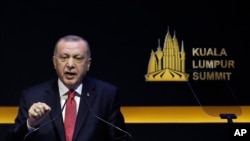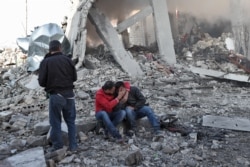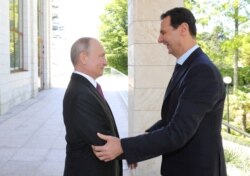Turkish President Recep Tayyip Erdogan is warning of another refugee exodus from Syria as government forces there conduct airstrikes against rebel targets in Idlib province. With Russian forces backing the assault, Ankara and Moscow face a looming threat to their recent warming ties.
"Now, there are 50,000 people coming to our lands from Idlib. We already host 4 million people, and now, an additional 50,000 are coming. Maybe this figure will increase even further," Erdogan said Thursday at the Kuala Lumpur summit of Muslim world leaders in Malaysia.
Erdogan gave no details on whether any of the refugees had reached the Turkish border. Idlib province is the last main rebel-controlled area in Syria. Around 3 million people are believed trapped in the enclave that borders Turkey.
The latest refugee exodus was triggered by the intense bombardment by Damascus, backed by Russian air power. Turkish officials say that around 200,000 refugees in Idlib are camped close to Turkey's border, after escaping a previous Syrian government assault.
"This [Idlib] crisis is not only the problem of Turkey, but it's also the security problem of the European Union," said Mesut Casin, a foreign policy adviser to Erdogan.
Erdogan also renewed his criticism of the international community. "We spent over $40 billion. There is neither serious support from the United Nations High Commissioner for Refugees nor does the European Union fulfill the promises it gave. No one is keeping their word," he said.
Analysts say Erdogan is desperate to avoid another refugee exodus into Turkey. "He has faced the consequences of keeping so many refugees in Turkey," said international relations professor Serhat Guvenc, of Istanbul's Kadir Has University.
"The result was the loss of major urban centers in recent local elections, including Istanbul. Many advisers and analysts link the loss to hosting refugees," he added.
Guvenc warns a new wave of refugees could well be passed on to Europe. "Erdogan holds the threat of opening up borders to Europe. Like a sword of Damocles over the EU, he is repeatedly warning this," said Guvenc.
Local media reports from Idlib suggest the latest offensive by Damascus could just be preparation for a major offensive to retake the enclave. "Pressure on Idlib, it makes for an explosive cocktail for everybody," said political scientist Cengiz Aktar of Athens University. "Greece is already struggling with the steady flow of refugees coming from neighboring Turkey."
A Damascus-led offensive would likely also put Ankara and Moscow on a collision course. Last year, Erdogan and Russian President Vladimir Putin hammered out an agreement that guaranteed Idlib's protection.
While Erdogan is a strong backer of the Syrian rebels and Putin of the Damascus government, the two men have increasingly cooperated in seeking to resolve Syria's civil war.
Such cooperation has fostered more extensive improvement in Turkish-Russian relations, much to the alarm of Turkey's NATO allies.
Analysts point out that given Erdogan's strained relations with his traditional Western allies over myriad differences, a deepening relationship with Moscow makes tactical sense.
Ultimately, however, regional policy differences are predicted to be increasingly difficult to manage. "In the long run, Turkish and Russian Middle East policies do not converge, because of their two different interpretations of the situation," said international relations professor Huseyin Bagci of Ankara's Middle East Technical University.
"In Idlib, Putin is committed to supporting [Syrian President Bashar al-] Assad's reclaim of control of all of the Syrian territory. For Erdogan, he is determined to defend the rebel enclave. Something will have to give," he added.
Some analysts suggest that Putin uses the threat of an offensive in Idlib as leverage on Ankara. The looming crisis over Idlib comes as Ankara and Moscow are facing a new dispute over Libya.
Ankara appeared to have taken Moscow by surprise when Erdogan signed a security agreement last month in Istanbul with Fayez al-Sarraj, head of the Presidential Council of Libya's Government of National Accord, or GNA. Sarraj is Libya's internationally recognized prime minister.
Under the agreement, the Tripoli-based government can invite Turkish forces to deploy in Libya. According to local media reports, Ankara is preparing a rapid action force for possible deployment.
Erdogan said he was reacting to the presence of what he called "Russian Wagner mercenaries," which are fighting for General Khalifa Haftar, the de facto leader of a rival government in eastern Libya. The Wagner Group is a private security force run by Yevgeny Prigozhin, a businessman with close links to the Kremlin.
"I wish that the matter of Haftar would not create a new Syria in our relations with Russia," Erdogan said in a television interview earlier this month. The two governments in Libya have been at war with each other as they jockey for power. Haftar is seeking to overthrow the GNA.
Unverified reports from Libya claim the GNA has already requested Turkish military assistance. Ankara has so far not commented on the reports. Libya has been riven by turmoil and division since a NATO-backed uprising that toppled and killed dictator Moammar Gadhafi in 2011. Ankara is set to dispatch a diplomatic delegation to Moscow to discuss differences over Libya.
Bagci says ties with Moscow "may not become sustainable" if Turkey insists on sending troops to Libya.
"The party, I think, that will eventually have to step back is Turkey. Moscow has too much leverage over Turkey," he added.







